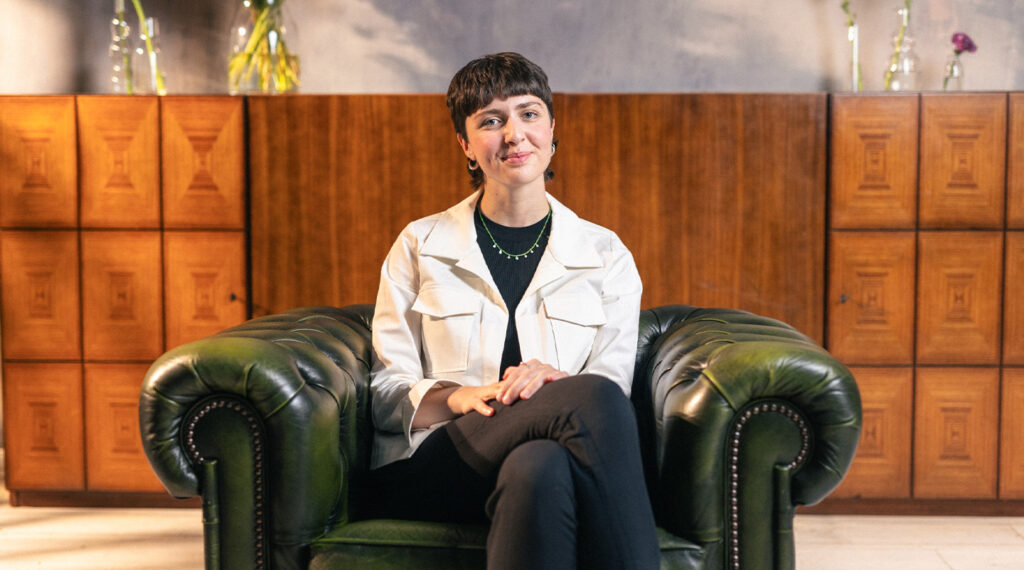The novel way of the entrepreneur: How young people change entrepreneurship and what they need to flourish

Entrepreneurial landscapes evolve with each generation. We are thus witnessing a significant shift today shaped by the emerging Generation Z (or Gen Z) workforce. With their ascent into the entrepreneurial sphere, understanding and integrating their unique values and approaches toward the sustainable and digital transition is critically important. What is the impact of Gen Z entrepreneurs on sustainability, what challenges do they face, and what are the policy considerations required to support them better?
“I think we are a generation that has a big emotional intelligence, a generation that cares a lot about the world and about other people”, explains Vittoria Brolis, the 26-year-old founder of Hale, a startup providing accessible and personalised support for people with genito-pelvic pain through a virtual clinic and patient community. Vittoria is part of a group of six Sigma Squared fellows, a dynamic entrepreneurship society of more than 800 fellows under the age of 26, that gathered in Berlin in September last year to discuss sustainable and social entrepreneurship.
About a year ago, the Italian-born entrepreneur moved to Berlin having been awarded a grant from the European Union in cooperation with the city of Berlin on HealthTech, which describes any IT tools or software designed to boost hospital and administrative productivity, give new insights into medicines and treatments, or improve the overall quality of healthcare provided. Since then, she has worked on expanding the business, driven by her ambition to change the lives of the estimated 26% of people with chronic intimate pain for the better.
Creating positive impact
Born into an era of digital fluency and acute environmental awareness, young entrepreneurs like Vittoria are not just seeking to create profitable ventures. A growing number of young entrepreneurs worldwide now envision their businesses to positively impact the planet and people. Therefore, the drive towards sustainability or social purpose is not merely an add-on, but the core of their entrepreneurial spirit.
This generational shift towards sustainability-oriented and social business models is critical, as it aligns sustainable economic growth with environmental preservation and social progress. While not all startups put people and the planet first, their number keeps growing, and so does their potential to drive change in their work areas. New estimates put the number of social enterprises at 10 million worldwide, with $2 trillion in annual revenue, while creating 200 million jobs across multiple sectors.
Young entrepreneurs face a multitude of challenges
Alas, the world being in constant crisis mode – the mental health crisis, exacerbated by climate anxiety and the pressures of constant digital connectivity – weighs heavily on young people. Entrepreneurs are no exception here. The entrepreneurial path is usually uncertain, which can put a strain on highly motivated entrepreneurs’ mental well-being. Additionally, navigating the complex maze of legal frameworks and regulatory requirements poses a significant hurdle, often termed “regulatory anxiety” by these young founders. This anxiety is not unfounded, as the labyrinth of bureaucracy can stifle innovation and prevent young minds from chasing their entrepreneurial dreams.
How to cultivate an ecosystem where young entrepreneurs thrive
Now a successful young entrepreneur, Vittoria has an opinion on what needs to change for young people to follow their entrepreneurial calling and the supporting ecosystem: “I think we need to give space to experiment and fail and make mistakes and learn”. This hands-on mentality is reflected by other voices in the Sigma Squared network and a well-known fact in entrepreneurship education.
For example, education systems should foster practical, hands-on learning experiences that resonate with Gen Z’s dynamic preferences. Embedding sustainability and entrepreneurship education from an early age is crucial to equip future entrepreneurs with the skills and the entrepreneurial mindset required to tackle global challenges.
Moreover, the entrepreneurial ecosystem must evolve to be genuinely inclusive. Closing the gender gap and creating opportunities for founders from diverse backgrounds are critical. And finally, policies aimed at simplifying the bureaucratic maze, digitalising the application processes, and providing accessible financial support, can significantly lower the barriers to entry for young entrepreneurs.
A social and sustainable future
Listening to what young founders say is crucial for cultivating a sustainable and inclusive ecosystem, allowing more young people to take on daunting challenges with business acumen. Our cooperation with the Sigma Squared society allowed us to listen and jointly translate their ideas into media formats that resonate with potential future founders by choosing an adaptable video format. Instead of talking about young people, we need to talk more with young people about their ideas and the role they want to play in our societies and economies.
Empowering young entrepreneurs to establish sustainable companies is not just an investment in individual ventures but a commitment to a sustainable and equitable future for the many. Soon, young people between 15 and 24 years old will make up one-sixth of the world population, or about 1.3 billion people, by 2030. It is time to turn young people into solution partners at eye level.
Philanthropy can have a critical role in building this ecosystem and thereby supporting young entrepreneurs such as Vittoria. Chances range from acknowledging social enterprises as critical changemakers with specific demands to providing patient capital for developing new social enterprises to a point where they are investable and have their impact firmly embedded in the system. As we navigate the complexities of the 21st century, young entrepreneurs’ courage, innovation, and determination offer a blueprint for a brighter and more sustainable world.
We all love good stories. I’ve you’re inspired by Vittorias’ story, watch the full documentary on our new GenNow website. Go to https://www.gennow.de/.
Authors

